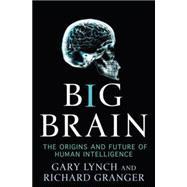
| Big Brains, Bigger Brains | p. 1 |
| Introduction | p. 1 |
| Biggest Brain | p. 3 |
| Are Bigger Brains Better? | p. 5 |
| Brain and Language | p. 7 |
| Were Boskops Smarter? | p. 8 |
| Why Haven't We All Heard of Boskops? | p. 10 |
| Outline of the Book | p. 11 |
| The Mind in the Machine | p. 17 |
| Learning Network Codes | p. 18 |
| Brain Circuits vs. Computer Circuits | p. 23 |
| The Brain of John Von Neumann | p. 25 |
| Genes Build Brains | p. 33 |
| How Much Variation Can Occur? | p. 36 |
| Blueprint Systems | p. 38 |
| Bundling Genes | p. 40 |
| Variation Is Random, but It Is Constrained | p. 44 |
| Brains Arrive | p. 51 |
| First Brains | p. 52 |
| Brain Expansion | p. 58 |
| The Brains of Mammals | p. 63 |
| Neurons and Networks | p. 65 |
| Learning | p. 70 |
| From Olfaction to Cognition | p. 73 |
| From Cortex to Behavior | p. 80 |
| Neocortex | p. 84 |
| The Thinking Brain | p. 89 |
| Extending Thinking over Time | p. 93 |
| The Cortex Takes Charge | p. 96 |
| The Tools of Thought | p. 99 |
| Feedback and Hierarchies of Cortical Circuits | p. 99 |
| Sequences | p. 106 |
| What One Brain Area Tells Another Brain Area | p. 107 |
| What's in an Image? | p. 108 |
| Putting It Together: From Generalists to Specialists | p. 109 |
| Memory Construction | p. 110 |
| Building High-level Cognition | p. 113 |
| Libraries and Labyrinths | p. 114 |
| Grammars of the Brain | p. 116 |
| From Brain Differences to Individual Differences | p. 119 |
| Brain Paths | p. 122 |
| Brain Tracts and Differential Abilities | p. 125 |
| Nature and Nurture | p. 127 |
| What's in a Species? | p. 129 |
| Definitions | p. 131 |
| Fallacies of the Notion of Race | p. 132 |
| Races Versus Gene Pools | p. 135 |
| The Origins of Big Brains | p. 139 |
| Brain Size in the Primates | p. 141 |
| Brain Size in the Family of Man | p. 145 |
| Big Babies | p. 154 |
| On Intelligence | p. 157 |
| Giant Brains | p. 161 |
| The Man of the Future | p. 162 |
| How Giant Brains Were Forgotten | p. 165 |
| Inside the Giant Brain | p. 171 |
| Giant Brains and Intelligence | p. 175 |
| All but Human | p. 179 |
| On Science | p. 179 |
| Differences | p. 182 |
| From Quantity to Quality | p. 189 |
| From Brain Advances to Cognitive Advances | p. 191 |
| From Cognition to Language | p. 193 |
| Learning Curve | p. 195 |
| From Speaking to Writing | p. 197 |
| More than Human | p. 201 |
| Brain and Superbrain | p. 201 |
| New Paths, New Humans | p. 204 |
| The Final Path to Humans | p. 205 |
| Inconstant Brain | p. 209 |
| Next Steps | p. 211 |
| Coda | p. 214 |
| Appendix | p. 217 |
| Acknowledgments | p. 233 |
| Bibliography | p. 235 |
| Index | p. 255 |
| Table of Contents provided by Ingram. All Rights Reserved. |
The New copy of this book will include any supplemental materials advertised. Please check the title of the book to determine if it should include any access cards, study guides, lab manuals, CDs, etc.
The Used, Rental and eBook copies of this book are not guaranteed to include any supplemental materials. Typically, only the book itself is included. This is true even if the title states it includes any access cards, study guides, lab manuals, CDs, etc.